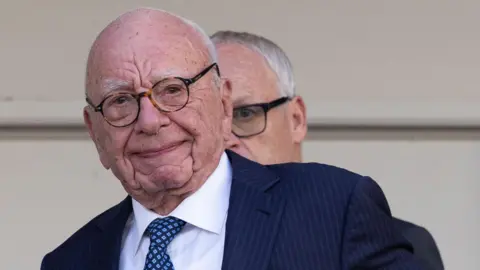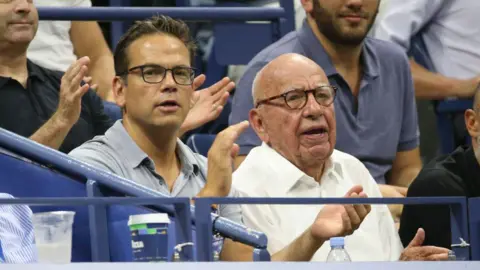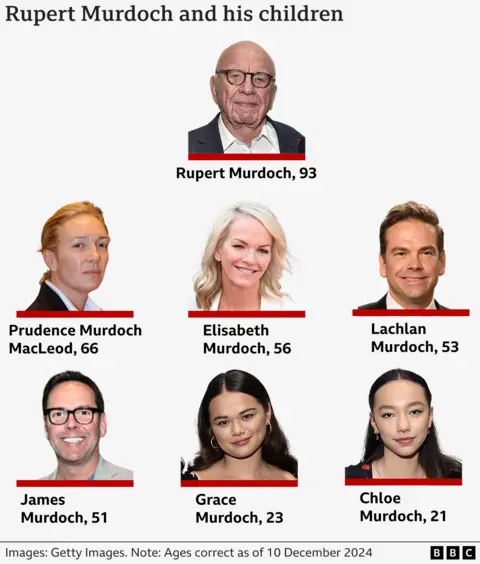Murdoch loses bid to change trust in real-life 'Succession' battle
 Reuters
ReutersA real-life "Succession" battle for Rupert Murdoch's media empire has ended with a Nevada court commissioner denying the billionaire's bid to change a family trust and give control to his eldest son.
The case pitted the 93-year-old against three of his children over who would gain the power to control News Corp and Fox News when he dies.
It has been reported that Mr Murdoch wanted to amend a family trust created in 1999 to allow his son Lachlan to take control without "interference" from his siblings Prudence, Elisabeth and James.
A Nevada commissioner ruled Mr Murdoch and Lachlan had acted in "bad faith" and called the efforts a "carefully crafted charade", according to the New York Times.
 Getty Images
Getty ImagesIn a statement, a spokesperson for Prudence, Elisabeth and James said: "We welcome Commissioner Gorman's decision and hope that we can move beyond this litigation to focus on strengthening and rebuilding relationships among all family members."
Adam Streisand, a lawyer for Mr Murdoch, told the New York Times they were disappointed and planned to appeal.
A spokesperson for Mr Murdoch declined to comment to the BBC. Mr Streisand did not immediately respond to inquiries.
The famous family was one of the inspirations behind the hugely popular TV series Succession - something the Murdochs have always refused to comment on.
But according to the New York Times report, which is based on a copy of the sealed court ruling, the billionaire's children had started discussing their father's death and how they would handle it after an episode of the HBO series where "the patriarch of the family dies, leaving his family and business in chaos".
The episode led to Elisabeth's representative to the trust writing a "'Succession' memo" that sought to prevent this from happening in real life, said reports.
The case has played out behind closed doors in Nevada, a state that offers one of the most confidential legal settings for matters including family trust disputes.
It has a "close on demand" statute that allows parties involved in certain sensitive cases to request that court proceedings be sealed from public access, ensuring complete privacy.
Mr Murdoch, who has been married five times, also has two younger children, Grace and Chloe, who do not have any voting rights under the trust agreement.

The case was launched after Mr Murdoch decided to change the trust over worries about a "lack of consensus" among the children, the Times reported.
Lachlan is thought to be more conservative than his siblings and would preserve the legacy of his media brands.
From the 1960s, Mr Murdoch built a global media giant with major political and public influence.
His two companies are News Corporation, which owns newspapers including the Times and the Sun in the UK and the Wall Street Journal in the US, and Fox, which broadcasts Fox News.
Mr Murdoch had been preparing his two sons to follow in his footsteps, beginning when they were teenagers, journalist Andrew Neil told the 2020 BBC documentary The Rise of the Murdoch Dynasty.
"Family has always been very important to Rupert Murdoch, particularly from the point of view of forming a dynasty," the former Sunday Times editor said.
In 1999, the Murdoch Family Trust, which owns the media companies, was supposed to largely settle the succession plans.
It led to Mr Murdoch giving his eldest children various jobs within his companies.
The trust gives the family eight votes, which it can use to have a say on the board of News Corp and Fox News. Mr Murdoch currently controls four of those votes, with his eldest children being in charge of one each.
The trust agreement said that once Mr Murdoch died, his votes would be passed on to his four eldest children equally.
However, differences in opinions and political views were said to lead to a family rift.
The battle over changes to the trust was not about money, but rather power and control over the future of the Murdoch empire.
The commissioner's ruling is not final. The court filing acts as a recommended resolution but a district judge will still weigh in and could choose to rule differently.
The judge could take weeks or months to make a decision, which will not be available to the public.
Additional reporting by Michelle Fleury and Charlotte Edwards
